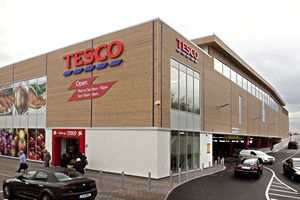 more time to undergo the “most radical” changes in years as Britain’s biggest grocer improves stores, alters shop formats and cuts prices to fight competition, Chief Executive Officer Philip Clarke said.
more time to undergo the “most radical” changes in years as Britain’s biggest grocer improves stores, alters shop formats and cuts prices to fight competition, Chief Executive Officer Philip Clarke said.“It’s not happening overnight,” Clarke said at the company’s annual shareholder meeting in London on Friday. “The changes we are undertaking are the most radical for generations.”
Clarke is under increasing pressure from investors impatient with his inability to turn the business around. Tesco’s shares have dropped about 30 percent since he took the helm three years ago and are close to a 10-year low. The CEO said earlier this month he’s not ready to pledge an improvement in revenue growth after reporting the sharpest drop in U.K. sales in at least four decades.
Britain’s shoppers, who account for about two-thirds of Tesco’s sales and profits, are defecting to Aldi and Lidl, German discounters wooing customers with lower prices and fewer frills. Mainline competitors including Wal-Mart Stores Inc.’s Asda and Wm Morrison Supermarkets Plc are stepping up competition with measures similar to Tesco’s.
Tesco must not “flinch” from plans to improve stores and invest in customer loyalty efforts even as it cuts some prices, Chairman Richard Broadbent said at the meeting.
Sales Decline
“Implementing these initiatives has a cost and this has had an impact on short-term performance, compounded by the weak market conditions that are affecting all retailers,” he said.
Tesco’s shares fell 0.4 percent to 283.95 pence at 4:23 p.m. in London on Friday
Tesco’s sales declined 3.3 percent in the 12 weeks ended May 24, while its market share dropped to 28.2 percent from 29.5 percent a year earlier, researcher Nielsen Holdings NV said June 5. Aldi and Lidl’s sales during that period soared 33 percent and 23 percent respectively.
While shareholders took the board to task over the decline in share price, wages, the perceived arrogance of the board and issues at local stores, there were no surprise events like last year when the company’s former Chairman Ian MacLaurin stood up and publicly criticized the legacy left by Clarke’s predecessor Terry Leahy.
Director Vote
Clarke was re-elected as a director with 98.86 percent of the votes. He told journalists afterwards that he did not view it as an endorsement or vindication of the strategy.
“I do not use that language,” he said. “I don’t think now is the time to talk about vindication or endorsement. Now is the time we set out in a world where retail is changing.”
Clarke has maintained that it’s impossible to beat the discounters on price and that his formula hinges on refreshing large stores and retraining staff. Even so, he announced in February that the retailer would invest at least 200 million pounds ($340 million) a year to lower prices on essential food items such as milk, eggs and produce.
He said today that more price reductions are on the way and defended his record.
‘Much More’
“The plan has delivered improvements in all aspects of customer experience, but there is much, much more to do,” Clarke said. “Prices are down, and staying down is a powerful message,” though they won’t deliver an “instant sales increase.”
Tesco’s price changes came as rivals Asda and Morrison pledged to spend about 1 billion pounds each to lower prices. J Sainsbury Plc, the U.K.’s third-largest supermarket operator, said last week it would enter the discount market by bringing back Netto stores. Netto disappeared from Britain after Asda bought its 193 stores in the country and converted most of them to supermarkets.
The surprise Netto announcement had little impact on Sainsbury’s shares. Both Sainsbury and Tesco, with share declines of about 14 percent this year, have outperformed Morrison, which is down 30 percent.
While analysts including HSBC’s David McCarthy and Shore Capital’s Clive Black have suggested Tesco should escalate a price war, some large investors are saying that probably wouldn’t help.
Discounter Advantage
David Herro, chief investment officer at Chicago-based Harris Associates LP, which owns a stake in Tesco, said June 6 that Clarke needs another 18 months for a turnaround. The grocer can’t beat discounters on price because they are privately held and less susceptible to shareholder pressure, he said.
Broadbent said today that the grocery landscape has changed dramatically as a sustained period of declining disposable income sent consumers to discounters, and as the Internet alters shopping methods. Prolific use of social media is also changing customer behaviour, he said.
“There might be a temptation to hunker down, to concentrate on defending what we have got and to respond only by cutting prices and costs,” Broadbent said. “But make no mistake: While we might have an apparently easier ride for a time, this would be a business strategy of decline.”







